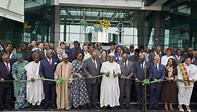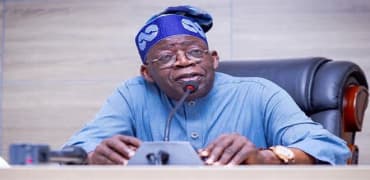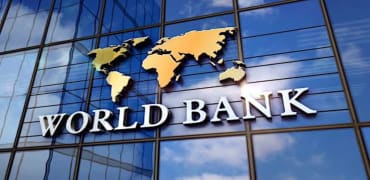Tinubu Unveils New Vision to Make Africa Trade with Africa
Tinubu Unveils New Vision to Make Africa Trade with Africa
By Achimi Muktar
President Bola Tinubu has thrown his weight behind a bold new vision to reshape Africa’s economic destiny — one where Africans trade more with Africans, and the continent no longer depends heavily on foreign imports.
Speaking through Senator George Akume, Secretary to the Government of the Federation, Tinubu made the declaration at the official commissioning of the Afreximbank Africa Trade Centre (AATC) in Abuja on Thursday — a striking new hub for intra-African commerce, innovation, and collaboration.
The launch event was a high-powered gathering of Africa’s most influential leaders and economic players, including billionaire industrialists Aliko Dangote and Tony Elumelu.
“This is more than just a building,” the President said in a statement read by Akume. “It is the beginning of innovation, a hub for entrepreneurship, and a catalyst for sustainable development. It is a bold step toward unlocking Africa’s massive economic potential.”
The Future of African Trade Starts Here
The AATC is a multipurpose structure equipped with a conference facility, hotel, exhibition centre, and more — all designed to facilitate trade, attract investment, and promote knowledge sharing.
But the ambitions behind it go far beyond the walls. According to Tinubu, the centre will serve as a launchpad for new trade corridors across Africa, reduce dependency on foreign imports, and empower small businesses and women-led enterprises to access continental markets and finance.
“To build a prosperous Africa,” he said, “we must first build a connected Africa.”
Afreximbank’s Big Play
Afreximbank President, Prof. Benedict Oramah, painted a wider vision: a continent-wide network of digitally connected trade hubs spanning Africa and the Caribbean. These trade centres, he said, would provide support for SMEs and innovators looking to scale their operations beyond borders.
“We planted a seed — one that would grow into a platform for reconnecting with our own, at a time we need it most,” Oramah declared.
He revealed that Afreximbank has played a key role in boosting Nigeria’s industrial growth, citing achievements such as:
Supporting oil refining capacity increases to 1.2 million barrels/day
Expanding urea fertilizer production from under 4 million tonnes in 2019 to a projected 11 million tonnes by 2027
Co-founding an Energy Bank to solve financing constraints in the oil and gas sector
These interventions, he said, have significantly improved Nigeria’s non-oil export revenues — a crucial step toward true diversification.
Turning Abuja Into Africa’s Service Capital
Nigeria’s Minister of Finance, Wale Edun, praised the Bank’s decision to site the AATC in Abuja, saying it would help transform the capital into a “major service hub” for West Africa and beyond.
He encouraged both public and private sector stakeholders to take full advantage of the opportunities the centre offers.
Why It Matters
Nigeria still leans heavily on crude oil and raw materials. In Q4 2024, 68.87% of total exports were crude oil. Other exports included petroleum gases, LNG, cocoa, and urea — pointing to an economy still stuck in primary goods.
With the commissioning of the AATC and a renewed focus on trade within the continent, the Tinubu administration is aiming to reverse this trend and push Nigeria — and Africa — into an era of value creation, diversified exports, and regional prosperity.





















